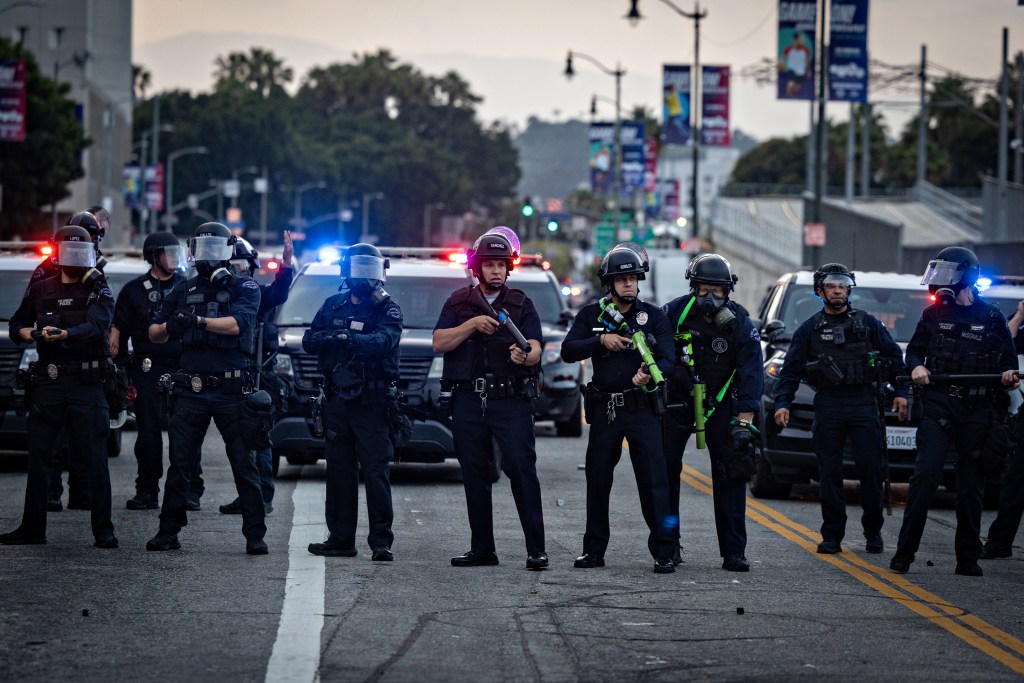The roiling confrontation in Los Angeles over immigration enforcement has laid bare President Donald Trump’s hunger for confrontation with those sections of the country that oppose him and his agenda. In words and actions alike, Trump has shown he views blue states and cities not as legitimate partners in governing, but as hostile territory to be subdued.
That perspective has shaped his approach to the Los Angeles conflict from the outset. First, his administration executed the initial immigration raids in a manner it had to know was most likely to trigger protests — raiding workplaces and imposing a highly visible enforcement presence on immigrant-heavy neighborhoods.
Then, when the inevitable protests erupted, Trump rapidly federalized the California National Guard without even a pretense of coordinating with Gov. Gavin Newsom.
When Trump’s decision predictably spurred more intense protests, his administration used the disorder and occasional violence to double down, deploying active-duty Marines and dangling the possibility of arresting Newsom and Los Angeles Mayor Karen Bass. At each step, the White House took actions that made chaos more likely and then used that chaos to justify further escalation. Rather than calming tensions, Trump’s role has been to heighten them.
Trump’s choice to quickly send troops onto LA’s streets reflects his long-standing eagerness to dispatch federal forces into blue jurisdictions. The president is not a man who often admits to regrets, but he’s said publicly that one of his greatest first-term qualms is that after objections from local officials, he did not send the National Guard into Minneapolis sooner during the protests following the murder of George Floyd in 2020.
In the 2024 presidential campaign, Trump said that he would send federal forces, including the National Guard, into big cities for multiple purposes, with or without the approval of local officials: clearing the homeless, supporting his mass deportation program, even fighting street crime in cities where he said, “there’s been a complete breakdown of public safety.”
Trump hasn’t yet tried to implement those ideas. But the presidential memorandum Trump signed June 7 seizing control of the California Guard shows that he retains an expansive appetite for inserting federal forces into blue jurisdictions. Nowhere does the memo mention Los Angeles, or even California. Rather, Trump says he is authorizing the use of the National Guard — and active-duty military if necessary — at any “locations where protests against [immigration enforcement] functions are occurring or are likely to occur.”
Never before has a president claimed such an unbounded right to deploy the military on domestic soil, Elizabeth Goitein, senior director of the Liberty and National Security Program at New York University’s Brennan Center for Justice, told me. There is no law “under which it is appropriate for the president to engage in a preemptive nationwide deployment of troops for protests that may or may not become violent,” she said.
Sign up for Viewpoints, an opinion newsletter
Trump’s threats to inject federal forces into blue jurisdictions are only one prong of his campaign to subjugate them. His administration has already arrested a mayor and a U.S. Representative in New Jersey; a judge in Milwaukee; and a union leader in Los Angeles — all on charges of interfering with immigration enforcement.
He’s threatened to cut off federal funding for blue states and cities unless they adopt conservative policies on immigration, transgender rights, racial diversity and other issues. Immediately before the protests erupted in Los Angeles, multiple media reports indicated Trump’s administration was preparing a massive cancellation of federal money for California — including a sweeping termination of scientific research grants to the University of California.
Trump is governing as a wartime president, with blue America, rather than any foreign adversary, as the enemy. He is trying to use national power for factional ends: to impose the priorities of red America onto blue states and cities that have rejected them. The smoke that rose from downtown Los Angeles last weekend is a warning flare of how much division and danger lies at the end of that road.
Ronald Brownstein is a Bloomberg Opinion columnist covering politics and policy. He is also a CNN analyst and previously worked for The Atlantic, The National Journal and the Los Angeles Times. He has won multiple professional awards and is the author or editor of seven books.
